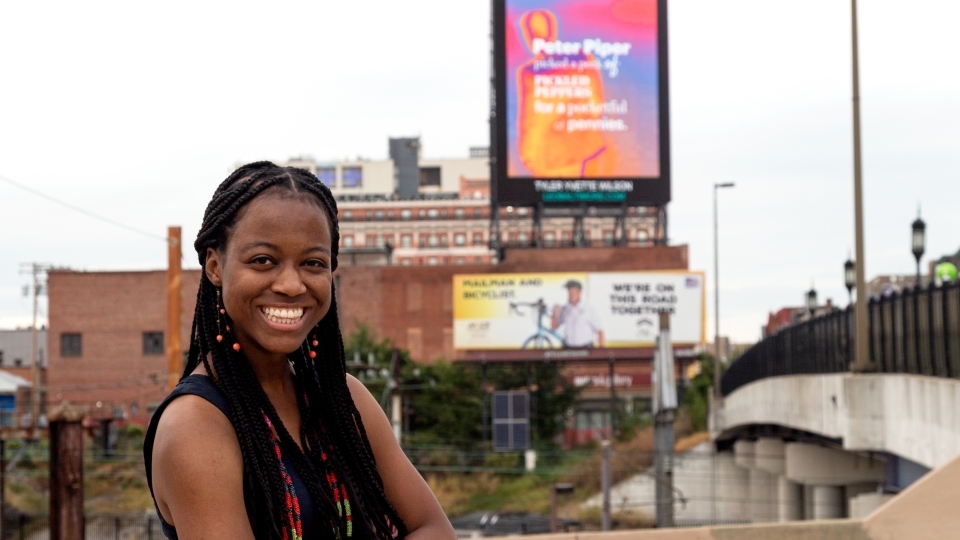Stop, Look and Listen: Tyler Wilson’s Art Meant to Give Pause, Spark Conversations
June 16, 2020
- Author
- Mary Elizabeth DeAngelis

Tyler Yvette Wilson used to avoid creating art that made people uncomfortable.
Not anymore. The deeper she gets into her practice, the more she strives to encourage others to think about, challenge and change systems that hurt society’s most vulnerable.
She commands a large canvas: During the past year several of her pieces have popped up as Baltimore billboards. She hopes her art gives passing travelers and downtown walkers pause.
One features a man’s shadow above the words of an old Mother Goose nursery rhyme: “Mary, Mary, quite contrary, how does your garden grow?
“Unpaid labor.”
Another piece offers this twist: “Jack be nimble, Jack be quick—and Jack! Don’t let the dogs catch your scent!”
Wilson wants her reengineered takes on the familiar nursery rhymes to start a conversation about slavery, immigration and the racial inequities that exist today.
“It bothers me that people avoid topics that need to be talked about,” Wilson says. “If framed properly, bringing those topics to light can lead to healthy, long-overdue conversations.”
Her work combines photography with text. Wilson recently completed an MFA program at Maryland Institute College of Art (MICA). Billboard company LED Baltimore has featured her work and others on a giant screen in the city’s arts district.
Detour
She didn’t start out as an artist. If all had gone as planned, the Bonner Scholar and women’s soccer team player would be a doctor with proficiency in Spanish.
But that all fell apart during Thanksgiving break of her third year of college, when she collapsed in the kitchen of her family’s Atlanta home.
She’d been eating trail mix when the seizure struck. She later found out she had epilepsy. Subsequent seizures ended up costing her some memory and the use of her left hand. The Hispanic Studies major lost her ability to process foreign languages.
She returned to Davidson that spring and switched her major to art. School was a struggle. Seizures, then heavy doses of anti-seizure medication left her exhausted and unable to take a full course load or graduate with her original class of 2014. She took two semesters off, had surgery in between, and came back determined to finish.
Former Davidson Visiting Assistant Art Professor Clint Sleeper says Wilson didn’t have the foundation that most art majors had by college, but worked hard to catch up.
“Like so many Davidson students, Tyler was incredibly ambitious and dedicated,” Sleeper says. “I would give her a list of artists and ideas to explore, and she’d come back, having done everything on the list and say ‘What’s next?’”
He is now an assistant professor at Florida State University and has kept up with Wilson’s evolution as an artist.
“It’s really nice to see her expand her practice and find her voice more broadly,” Sleeper says.
“She understands this moment in time. She has a powerful story and a different perspective about the potential of contemporary art to communicate not only her story, but the stories of her community.”
Opening Minds
Wilson says she always hesitated to tackle controversial work in college, but Sleeper challenged her to get out of her artistic comfort zone.
She created a video installation about hierarchal systems, economic class and race for her senior exit show, which she views as her first major step. The musical “Hamilton” also inspired her to create art as a change agent.
Her work with children, as a Bonner Scholar and Sunday school teacher, makes her want to do more.
“So many black and brown children experience poverty and violence,” she says. “They’re expected to understand the negative perceptions that others project onto them while maintaining a positive self-image. It’s a lot to deal with at a young age. I’m concerned about the education and exposure they receive from formal institutions and daily life.”
She hopes people who see her work—on a billboard, in a gallery, or online—expand their thinking.
“I want viewers to acknowledge the current state of affairs, analyze how the past led to this situation and consider what the future will look like based on our actions.
“With a nursery rhyme I can say, ‘I learned this as a kid—oh, you did too.’ Then we can talk about it,” she says. “I want people to consider what’s happening behind the scenes—to see the injustices—to peek behind the curtains, and want to do something about it.”
Artwork by Tyler Wilson ’14 is on a billboard in Baltimore. She uses nursery rhymes to tell stories about slavery. “I’m attracted to billboards as a way to show this series because I can blend historical and current aspects of commercialism.” Read more: https://t.co/C4oCgjevel pic.twitter.com/LaIIQ42dwz
— Davidson Alumni (@DavidsonAlums) October 3, 2019
Endnote: This feature appears in the spring/summer 2020 Davidson Journal magazine. Tyler Wilson says Davidson College faculty and staff, current and past, helped her through very tough times “and remain an integral part of my life.” She especially thanks Kathy Bray ’85, Magdalena Maiz-Pena, Carrie Lyon Heyl, Sharon Hill, Amy Johnson and Nance Longworth.



